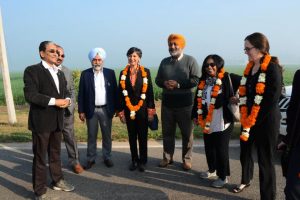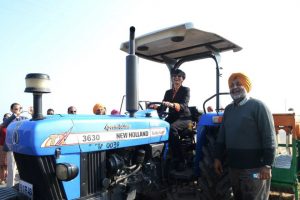Australian high commissioner’s visit to BISA farm at Ladhowal, Ludhiana and Climate Smart Village, Nurpur Bet
Harinder Sidhu, Australian High Commissioner, visited the Borlaug Institute for South Asia (BISA) in Ladhowal, Ludhiana, India on February 19. Arun Joshi, Managing Director for BISA & CIMMYT in India, welcomed her with an introduction about the creation, mission, and activities of BISA and the International Maize and Wheat Improvement Center (CIMMYT). HS Sidhu, the Senior Research Engineer for BISA, explained the work  CIMMYT and BISA were conducting in conservation agriculture in collaboration with Punjab Agricultural University, machinery manufacturers and farmers. This work focuses on using and scaling the Happy Seeder, which enables direct seeding of wheat into heavy loads of rice residue without burning. This technology has been called “an agricultural solution to air pollution in South Asia,” as the burning of crop residue is a huge contributor to poor air quality in South Asia.
CIMMYT and BISA were conducting in conservation agriculture in collaboration with Punjab Agricultural University, machinery manufacturers and farmers. This work focuses on using and scaling the Happy Seeder, which enables direct seeding of wheat into heavy loads of rice residue without burning. This technology has been called “an agricultural solution to air pollution in South Asia,” as the burning of crop residue is a huge contributor to poor air quality in South Asia.
He explained recent improvements in the technology, such as the addition of a straw management systems to add extra functionality, which has led to the large-scale adoption of the Happy Seeder. The high commissioner showed a keen interest in the Happy Seeder machine and was highly impressed by the test-wheat-crop planted on 400 acres with the Happy Seeder. Salwinder Atwal showed Sidhu the experiments using Happy Seeder for commercial seed production, and HS Sidhu and ML Jat, Principal Researcher at CIMMYT, presented on the innovative research BISA and CIMMYT is doing on precision water, nutrient and genotype management.
Dr. Joshi conducted Sidhu’s visit to trials of climate-resilient wheat and explained the importance and role of germplasm banks and new approaches such as the use of genomic selection in wheat breeding in the modern agriculture to address the current challenges of climate change. He also explained the work CIMMYT does on hybrid wheat for increasing yield potential and to breed higher resistance against wheat rusts and other diseases. ML Jat, who leads the CIMMYT-CCAFS climate-smart agriculture project, explained the concept of climate-smart villages and led Sidhu on a visit to the climate-smart village of Nurpur Bet, which has been adopted under the CGIAR Research Program on Climate Change, Agriculture and Food Security. During Sidhu’s visit to Nurpur Bet, a stakeholder consultation was organized on scaling happy seeder technology for promoting no-burning farming. In  the stakeholder consultation, stakeholders shared experiences with happy seeder as well as other conservation agriculture and climate-smart agriculture technologies. BS Sidhu, Commissioner of Agriculture for the Government of Punjab chaired the stakeholder consultation and shared his experiences as well as Government of Punjab’s plans and policies for the farmers to promote happy seeder and other climate-smart technologies.
the stakeholder consultation, stakeholders shared experiences with happy seeder as well as other conservation agriculture and climate-smart agriculture technologies. BS Sidhu, Commissioner of Agriculture for the Government of Punjab chaired the stakeholder consultation and shared his experiences as well as Government of Punjab’s plans and policies for the farmers to promote happy seeder and other climate-smart technologies.
“I am very impressed to see all these developments and enthusiasm of the farmers and other stakeholders for scaling conservation agriculture practices for sustaining the food bowl,” said Sidhu. She noted that Punjab and Australia have many things in common and could learn from each other’s experiences. Later she also visited the Punjab Agricultural University and had a meeting with the Vice Chancellor.
This visit and interaction were attended by more than 200 key stakeholders including officers from Govt. of Punjab, ICAR, PAU-KVKs, PACS, BISA- CIMMYT-CCAFS, manufacturers, farmers and custom operators of Happy Seeder.